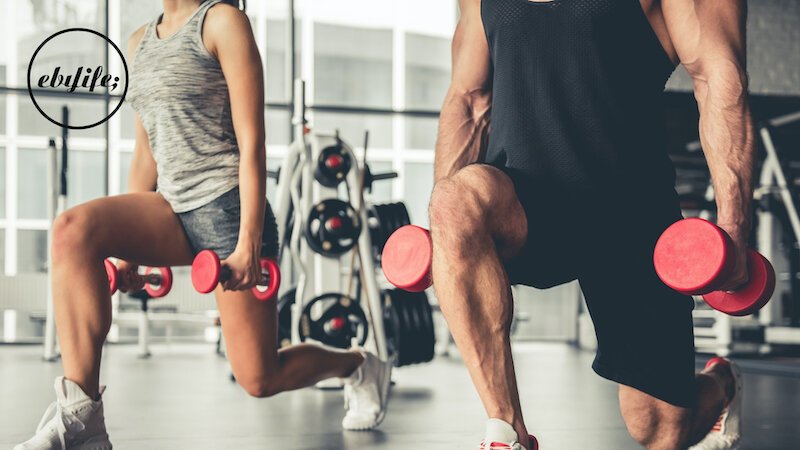Collagen vs. Whey: Which Is Better for Building Muscle?
Written by Martin Ebner, head PT and sports nutrition specialist at Ebylife
Packing on lean muscle mass is difficult, to say the least. It requires a watchful diet, a dedicated and consistent strength training and fitness routine, and adequate high-quality protein. Whey protein has long been the staple protein for most protein shakes, bars, and powders. Nowadays, however, there are many different types of protein available, and collagen supplements are staking their claim on the shelves of health foods stores and in the gym bags of many athletes and even bodybuilders.
There are many different things to consider when choosing a high-quality protein supplement. Chances are, you'll want something that's versatile, tasty, affordable, and relatively inexpensive. Whether you choose collagen or whey protein powder, both protein sources should be able to tick all of those boxes. However, they aren't necessarily equal when it comes to their health benefits or their ability to help you reach your muscle-building and fitness goals.
Keep reading to find out which protein supplement is a better muscle-builder.
Collagen Protein 101
The benefits of collagen are pretty widespread. Collagen is the most prominent in the human body. In fact, it's considered the main building block of all the connective tissues in the body. Collagen can be found in the muscles, ligaments, cartilage, skin, blood vessels, and just about every other connective tissue, you can think of. It's essential for wound healing, muscle growth, skin elasticity, joint health, gut health, hair and nail growth, and much more. The trouble is that the body's collagen production does not remain steady throughout our entire lives. Starting as early as your mid-twenties, collagen protein synthesis begins to slow and with it, unfortunately, come some negative side effects such as joint pain, sarcopenia (age-related muscle loss), thinning hair, and sagging skin. Cue collagen supplementation.
Collagen peptides are collagen proteins that have been derived from animal sources (such as cows, chickens, and fish) and hydrolyzed into a form that can be digested and absorbed by the human body. When collagen is consumed, it gets broken down into its three primary amino acids: glycine, proline, and hydroxyproline. This synergistic amino acid profile then stimulates the body to produce even more collagen to enhance muscle building and help fight the many signs of aging related to collagen depletion.
Whey Protein 101
Whey is a dairy product. It is derived from milk along with casein. Whey is the watery part of milk that becomes separated during cheese making or that you might see pooling on top of your yogurt. Sounds gross, I know! In order to be made into a supplement, the liquid is then dehydrated into powder form to create a whey protein concentrate that can easily be added to different recipes.
Whey is considered a complete protein source in that it contains all 9 essential amino acids. Amino acids that must be obtained via diet are histidine, isoleucine, leucine, lysine, methionine, phenylalanine, threonine, tryptophan and valine. Whey is particularly high in branched-chain amino acids (BCAAs) leucine, isoleucine, and valine. BCAAs have been shown to stimulate muscle protein synthesis and aid in muscle recovery. However, because whey contains dairy, people with lactose intolerance may find that it upsets their stomach or causes bloating and gas. If you’ve ever stepped foot in a bodybuilder gym, you know the smell can get funky! Furthermore, whey does not taste pleasant on its own so supplement brands need to add loads of artificial flavors and sweeteners to mask the nasty taste.
Which is the better muscle builder?
Both supplements can be taken to build muscle, speed up recovery, and even support weight loss by helping you to feel fuller and more satiated between meals. Let’s take a look at how they compare specifically when it comes to building lean muscle mass.
In the short term, one study found that Whey seemed to stimulate higher rates of protein synthesis than collagen, likely due to its higher concentration of BCAA leucine. If you follow a body-building or strength training routine and are eating plenty of meats and other plant-based protein sources, chances are you are getting enough BCAAs through diet alone. Collagen, on the other hand, provides amino acids that are harder to come by in your diet. Glycine and arginine in particular are components of creatine, a natural substance thought to improve strength, increase lean muscle mass, and promote muscle recovery. Unless you're cooking up a hearty pot of bone broth on a daily basis, it’s possible that you aren’t getting all the collagen and amino acids you need for optimal health and performance.
Some studies also point to collagen as a method to help maintain a positive nitrogen balance (anabolic) which also promotes muscle growth. Additionally, studies have found that consuming collagen post-workout improves body composition (ratio of fat to muscle). After a 12-week resistance training program paired with collagen supplements, those who consumed collagen were found to have increased fat-free mass, isokinetic quadriceps strength, and bone mass as well as decreased fat mass when compared to the placebo.
The winner
Both whey or collagen proteins are great options and will help to build muscle mass. However if pushed to choose one over the other, the additional health benefits of collagen supplementation make it my preferred protein source.
Personally, I go to Amandean for all my collagen protein needs. They have Grass-Fed Collagen Peptides, Unflavored Gelatin, and Wild-Caught Marine Collagen available. They also offer Premium Marine Collagen Packets which are absolutely perfect for travel. All of their supplements are non-GMO, sustainably sourced, and free of artificial flavors, sugars, gluten, and soy.
Fueling up before and replenishing post-workout is absolutely crucial to building muscle mass. Amandean makes it nice and easy to hit your pre and post-exercise collagen needs with their carefully calculated individual collagen packets (I take 2). Now you don't have to lug around a tub of protein when you need a quick boost on resistance training days. Just toss a packet or two in your gym bag and you’re good to go.


